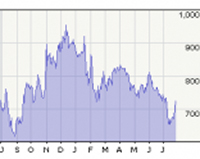Activist investor corners Sapporo
Sapporo shareholders could be in for a rude awakening if Steel Partners and allies decide to sell their 18.6 percent stake in the Japanese brewer. Without an activist stock owner around who’s keen to improve the brewer’s poor performance as well as buy more shares, the stock price may plummet.
After a year-and-a-half of spinning its wheels and getting bad press, the U.S. fund Steel Partners is getting impatient in the stalemate with Sapporo’s board, it was reported.
In the world of dealmakers, an activist investor is someone out to change a company for the benefit of its share price -- in other words, activist investors are driven purely by financial motivation. When Steel Partners first bought into Sapporo early last year, they hoped to obtain a controlling stake quickly in order to use their muscle to turn the company around. However, influential Japanese shareholders stopped Steel Partners in their tracks. They soon cut their goal down to one third of Sapporo’s shares. Even that goal has proven unobtainable.
Steel Partners, who are Sapporo’s major investor, may be genuinely worried that the value of their investment will fall unless Sapporo gets its act together quickly. These days, Sapporo resembles a property developer that brews beer. Given the contagious nature of the U.S. mortgage crisis, the sluggishness of Japan’s real-estate sector is a growing concern.
There is even more reason for concern: Sapporo’s second largest investor, Third Avenue Management, dropped its stake to 4.7 percent from 5.8 percent, according to a regulatory filing in July.
The 132-year-old company has resisted Steel Partner’s push for change so far, because of the support of key domestic shareholders. That’s allowed the brewer’s decline to continue. Beer sales for the first six months 2008 show that Suntory has replaced Sapporo in the number three slot in Japan, taking the spot its rival held for two decades.
It’s no wonder Sapporo’s return on equity is falling, even if a property sale should temporarily bolster returns this year. The brewer doesn’t lack ideas on how to bolster its business. Steel Partners submitted a 170-page report last year. That called for management to divest the non-core restaurant and nonalcoholic drink businesses, to improve margins at the already-strong real estate unit and to focus more on its popular, premium beer Yebisu which, ironically given Sapporo’s prospects, means "god of commerce."
Sapporo hasn’t paid serious attention to Steel Partners. Instead, it has persuaded investors to toughen up its takeover defences twice in as many years. That will look particularly short-sighted on Sapporo’s investors’ part if Steel Partners do decide to swear off beer and sell their stake in Sapporo.

